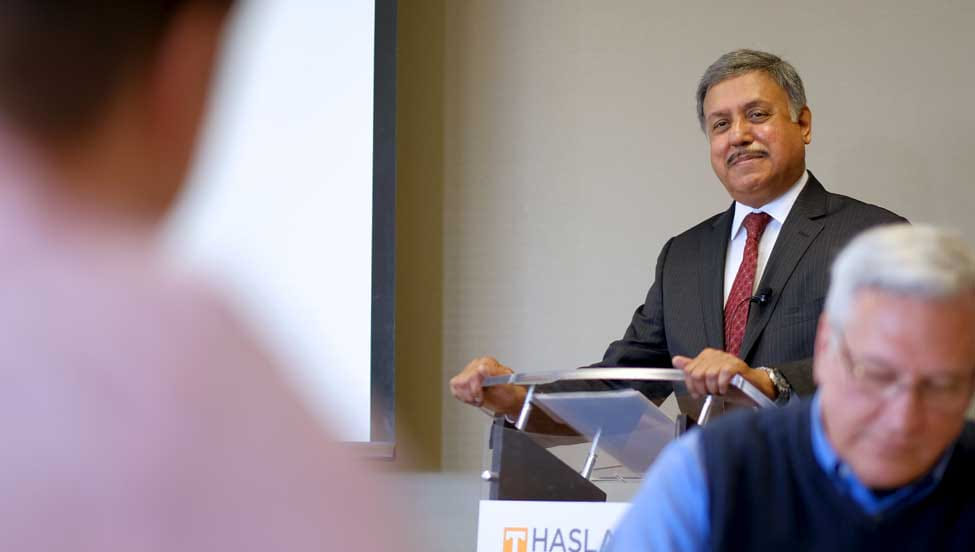
Ram Raju (PEMBA, ’00), senior vice president and community health officer at Northwell Health in New York, delivers his keynote speech.
A call to develop metrics of social engagement and understand the impact non-clinical conditions have on healthcare dominated a keynote speech delivered at the end of April by Ram Raju (PEMBA, ’00) at the University of Tennessee, Knoxville’s Haslam College of Business.
“For hospitals and healthcare providers, the policy debate about healthcare and socioeconomic conditions in this country is purely about money and prestige,” Raju said. “However, for patients it is about receiving the care they need. Therefore, it is our moral responsibility to work hand-in-hand with social services organizations across a wide spectrum to understand and improve socioeconomic conditions.”
Raju, senior vice president and community health officer at Northwell Health, the largest healthcare provider in the state of New York, addressed a group of physician leaders, healthcare executives and Physician Executive MBA students.
Raju has built his career around the notion that factors such as housing, income, food security and education have a direct impact on healthcare outcomes. He credits UT’s Physician Executive MBA program with equipping him to effectively advance his mission.
“I was a practicing surgeon and my leadership journey started with PEMBA,” Raju said. “It was a watershed moment in my career that gave me that opportunity to think and act differently.”
Jerry Blackwell (PEMBA, ’14) felt Raju’s keynote addressed core notions of physician leadership.
“Ram’s talk was really a call to arms, in my opinion, to better understand the totality of the patient population,” Blackwell said. “As physician leaders, we need to meet the folks where they are in their personal journey and take care of their health, not just their sickness. It’s a little bit of a catch phrase, but the key is the notion of population health.”
Raju pointed out that healthcare inequality shifts with time. What was once a debate almost entirely about race demographics now includes age, immigration status and lack of insurance, among other factors.
Social stigmas cost lives, Raju told the physician leaders in recounting the story of a man without legal immigration status whose blood test showed a dangerous level of potassium. He could not be treated because he had used a fake name and address on his intake forms, presumably out of fear.
“We were never able to track that patient down,” Raju said. “My medical sense tells me he is dead. This happens in our country – the greatest country – every single day. These people need to be pulled out of their invisibility.”
Avoiding similar situations and improving population health requires new and integrated metrics to track not only the treatment of individual illness, but also the impact of healthcare within communities, Raju said. He added that 80 percent of medical outcomes depend on conditions that are not clinical.
“Healthcare cannot be delivered in isolation,” Raju told the symposium audience. “Healthcare leaders need to be social change elements. My plea to you is to lead the way as you have lead in the past so many times.”
Related News
First Class of East Tennessee Children’s Hospital Physician Leadership Program Graduates Through Haslam
The leadership program empowers its students with a practical set of leadership skills and equips them to respond to the...
Read ArticleUT Haslam Alum Leads Expansion of Essential Medical Services in Rural Appalachia
Drawing on skills learned in Haslam's Physician Executive MBA program, Dayspring CMO Geogy Thomas led the medical organization's expansion into...
Read ArticleUT Haslam Teams with Leading Healthcare Practice Management Firm on New Leadership Development Program
Core Clinical Partners will send its Emergency and Hospital Medicine Administrative Fellowship to Haslam’s Physician Executive MBA program.
Read ArticleOnline Courses Fuel Record Enrollment in Haslam Graduate and Executive Programs
A total of 1,050 students are enrolled in Haslam Graduate and Executive Education programs this fall, up from 2023’s 888.
Read Article
